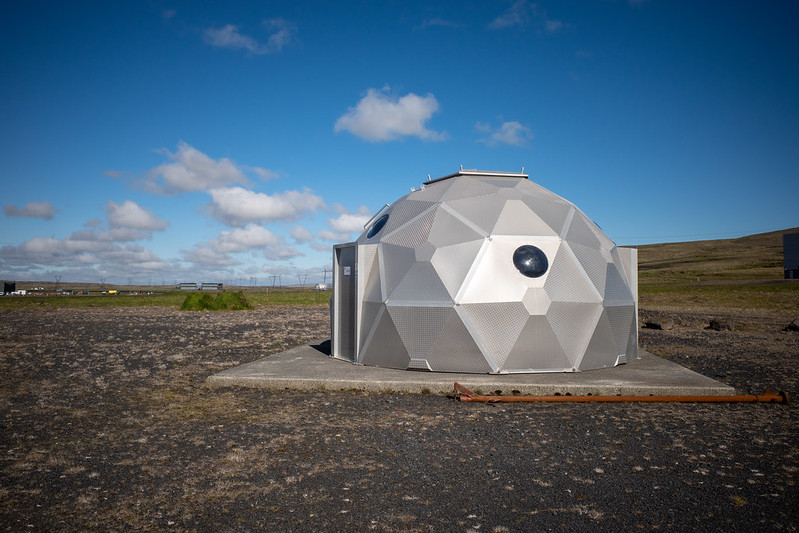Summarize this content to 2000 words in 6 paragraphs
Inside this structure near Reykjavík, Carbfix is injecting carbon dioxide dissolved in water deep underground where it reacts with basalt and mineralizes. (GeekWire Photo / Lisa Stiffler)
Spokane, Wash.-based startup CarbonQuest announced a partnership with Iceland-based Carbfix, a global leader in carbon storage, to team up in deploying technologies that address climate change.
CarbonQuest sells devices that pair with buildings and smaller natural gas operations such as gas boilers, fuel cells and industrial activities. It has developed a filter that can pull out approximately 90% of the carbon dioxide from an emission source’s flue — trapping the plant-warming pollutant before it reaches the atmosphere.
Carbfix’s technology is able to take captured CO2, dissolve it in water and then inject it into basaltic rock formations where it naturally mineralizes within two years. The technology is already being used in Europe, including a site in Iceland that has Microsoft as one of its customers and investors.
By joining forces through a memorandum of understanding, the companies hope to target medium-scale carbon emitters in the U.S. and Canada that could install the technologies at their industrial and manufacturing facilities.
One of the challenges for CarbonQuest has been finding a means of affordably disposing of its captured carbon.
In addition to pumping it into geologic formations, the carbon can be permanently sequestered in concrete or used for industrial processes, such as carbonating beverages, as feedstock for plastics, and to make sustainable aviation fuels. The CO2 can even be used for more fossil fuel extraction.
Shane Johnson, CEO of CarbonQuest, called Carbfix’s solution “a cost-effective and permanent way to mineralize captured CO2 even for emitters located far from a mineralization hub. This aligns with our goals to make the end-to-end CO2 capture and mineralization as local as possible.”
“Our partnership with Carbfix,” he added, “will accelerate the adoption of carbon capture throughout North America.”
A separate consortium is exploring potential carbon storage sites in the Pacific Northwest, which has an abundance of basalt. Carbfix is part of the effort, which is called the Ankeron Carbon Management Hub.
There are 14 investment-backed companies internationally working on point source carbon capture, according to a 2024 report from PitchBook. In addition to CarbonQuest, others include British Columbia-based Svante, Carbon America, ReCarbon and Ardent.
SEE RELATED:


